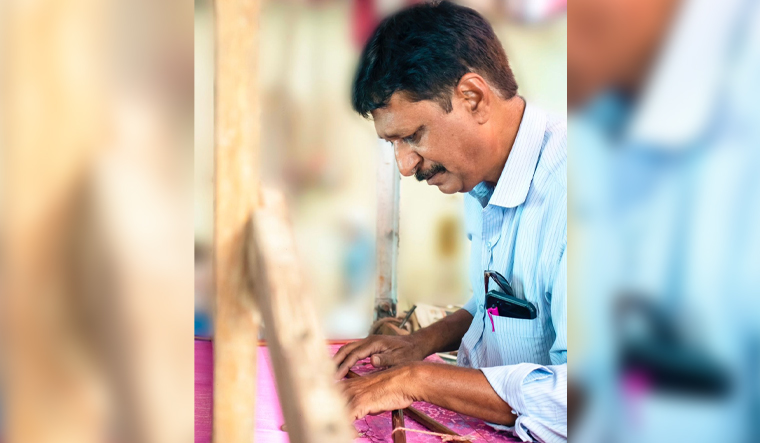When looking at Indian ancient art, it is common practice to look at the rich cultural diversity. Many people visit to see for themselves the richness this country holds. One such big is the varied yet very distinctive art form in the name of Rajkot Patola. Rajkot Patola is a very old and almost very rare form of textile art seen in the form of sarees. The production of Patola is considered to be an art and it has derived from a Sanskrit word called “Pattkalam.” This eventually turned into these beautiful silk cloth mostly in the form of a Saree. Dineshbhai Patolawala, a well-preserved brand took this art to a whole new fashion trend. Dinesh Makwana, the owner of the art house happens to have held on to and produced such rare art forms in India.
Achievements including AKHIL BHARAT KHADI- GRAMUDHYOG PRADASHINI by Akhil Bharat Khadi-Gramudhyog Mandal (1948-1949), later he also received the award of SILK MARK ORGANISATION OF INDIA by central silk board, ministry of India, the government of India in the year 2012-2013 and above all the enrollment of an ORDINARY to DINESHBHAI PATOLAWALA by silk mark organization of India has put them a high demanding rare clothing production art house in India. In conversation with Nirajbhai Makwana shed light on the history where he mentioned, “ It was once used to make garments for the royal families in Gujarat and later for high ranked noblemen. The basic design motifs on Rajkot Patola sarees include animals, flowers, human figures and birds. Gandhi's grandson Naran Das Gandhi and his sons Purushottam Gandhi and Kannu Bhai Gandhi established the Khadi Village Industries Association at the Rashtriya Shala in Rajkot city. Khadi Village Industries Association invited a group of 10 people, And through this institution total six weavers were trained in Rajkot Patola art. A total of ten quarters were arranged for the weavers in the National School. Rashtriya Shala and other land was allotted, on which he developed Sarvodaya Samaj and later this society was given to Rajkot Patola weavers. Presently, the Ministry of Textiles has records of 200 years of Rajkot Patola sarees, while those 70 years of records are still in the hands of the weavers of Rajkot. Our team is a bunch of experienced weavers who have been working on such rare art forms for ages.”
He adds, “It is almost like a pleasure to see such an art form still existing in India even after hundreds of decades. I would like to call this Rajkot Patola with a touch of modernity and classiness.” They have been working to keep the beautiful motifs of flowers, animal, and human figures in the Rajkot Patola saree alongside a touch of millennial love. Dineshbhai Patolawala aka Dineshbhai’s son Mr. Nirajbhai Makwana is an acting General Manager who loves to focus on his father's footsteps including the most important say by his father, “Consumer products are meant to be available as far as possible” and Niraj’s inheritance has brought him the sense of the right mix of modernity and creativity preserving such a meaningful art form. Dineshbhai Patolawala is a brand that stands strong when it comes to delivering to a huge consumer base and its E-Business has helped them grow. Their art house production is also keeping every bit of Rajkot Patola Saree alive.
Niraj adds, “One of the most recent weaving adaptations is by the weavers of Orissa, as they were constantly using it to weave their curtains, bedspreads, lungis, and scarfs amongst many other textile products. We are just another bunch of people making sure our future holds this art form alive for a long. Dineshbhai Patolawala is everything I ever dreamt of when it comes to being a creative house. My father made sure that this is alive and worked on it as if this was his passion. This is a true symbol of keeping the amazing culture of weaving going for years and not limiting it to just being another motifs designs.”











